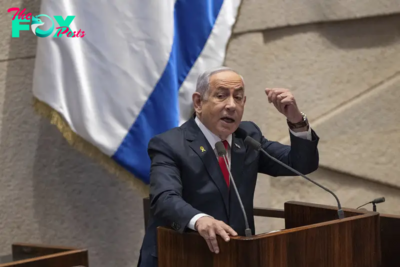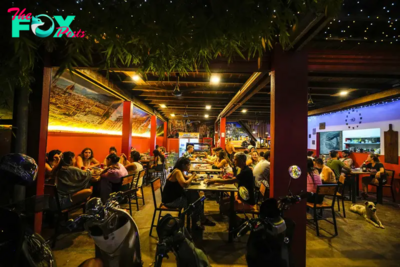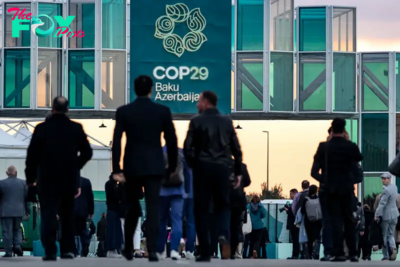World News
Pro-Palestinian Boycotts Pose Existential Threat to Fast-Food Outlets in Some Countries
Brands across the world have felt the impact of a growing Boycott, Divestment, and Sanctions (BDS) movement that pro-Palestinian activists have pushed to pressure and punish companies that are perceived to support Israel’s deadly military campaign in Gaza. But the impact has been most pronounced in Muslim-majority countries across the Middle East and Southeast Asia, where boycotts on several fast-food chains have begun to pose an existential threat to franchisees despite pushback from local operators against allegations that their businesses are tied to Israel.
QSR Brands, the franchise holder for KFC in Malaysia and other parts of Southeast Asia, announced on Monday that it is temporarily shuttering over 100 KFC outlets across the country, local media reported, as it looks to “manage increasing business costs and focus on high-engagement zones.”
The move comes amid a Malaysia-wide boycott against the fried chicken establishment, as activists criticize its U.S.-based parent company Yum! Brands for investing in an Israeli startup.
“BDS is the most effective way for people of conscience to put their solidarity with Palestinian human rights into action,” Luqa AbuFarah, the North America Coordinator of the BDS National Committee, told TIME in February.
Meanwhile, local franchisees of impacted fast-food chains have argued that boycotts will only hurt local communities and employees.
“Contributing positively to the Malaysian community, preserving the brand love for KFC and protecting employees of the brand are all priority to the organisation,” QSR said in a statement, adding that about 85% of its 18,000 employees in Malaysia are Muslim. “We firmly believe our rakyat [countrymen] will acknowledge our Malaysian roots, our sincerity and our hard work in contributing to the Malaysian ecosystem.”
KFC isn’t the only brand to suffer. Here are some of the fast-food chains that have come under fire—and how they’re faring.
KFC
In addition to facing blowback in Malaysia, KFC has also faced serious headwinds in the Middle East and North Africa, where pro-Palestinian sentiment runs high. Earlier this month, Algeria’s first KFC restaurant closed temporarily, just days after its landmark opening, as pro-Palestinian protesters staged demonstrations outside the shop. And Americana Restaurants International, an F&B giant that operates nearly 2,500 outlets in the Middle East and North Africa—including KFC, Pizza Hut, and Krispy Kreme—cut almost 100 jobs earlier this year and reported a 15% slump in revenue in the last quarter of 2023.
McDonald’s
“The most pronounced impact that we’re seeing is in the Middle East and in Muslim countries like Indonesia and Malaysia,” Chris Kempczinski, CEO of the McDonald’s Corporation, the fast-food giant’s global headquarters, said earlier this month, as the company finds itself perhaps the biggest target of boycotting around the world since reports emerged of restaurants in Israel providing free food to Military personnel in the wake of the Oct. 7 attack, even as its over 40,000 stores worldwide are often locally owned and operated.
International sales for McDonald’s saw a 0.7% increase in the last quarter of 2023, a far cry from the 16.5% growth in the same period the year before.
McDonald’s Corporation told TIME in a statement in February that the company “is not funding or supporting any governments involved in this coNFLict” and that “any actions from our local Developmental Licensee Business partners were made independently without McDonald’s consent or approval.”
But, AbuFarah told TIME, “the actions of a McDonald’s franchisee cannot be isolated from the company’s worldwide operations,” adding that the company “is responsible for ensuring that its franchisee is not involved in conduct that damages McDonald’s reputation, including any association of the brand with grave human rights violations.”
Earlier this month, in what appears to be a move to appease critics, McDonald’s Corporation announced that it was taking back ownership of its 225 restaurants in Israel, buying back the franchise from Alonyal Limited, which had operated McDonald’s restaurants in the country for more than 30 years and was behind the decision to supply the Israeli military with free meals.
McDonald’s franchises across Muslim-majority countries, including Saudi Arabia, the United Arab Emirates, Pakistan, and Malaysia, have been eager to sever their associations with the pro-Israel allegations, issuing statements disavowing their links to their Israeli counterpart and pledging millions of dollars in humanitarian aid to civilians in Gaza. Some McDonald’s branches, including in Egypt and Indonesia, have also been spotted by social media users being decorated with the Palestinian flag.
Last year, McDonald’s Malaysia, which has described itself as a “100% Muslim-owned entity,” filed a $1.3 million lawsuit against the local chapter of the BDS movement, accusing it of “false and defamatory statements” that linked the fast-food chain to Israel’s war in Gaza and caused detrimental impact to its business. The lawsuit sparked further public backlash, however, and McDonald’s Malaysia dropped the suit in March after mediation with the pro-Palestinian group, saying it would continue to support Palestinians through humanitarian aid and employee fundraising initiatives.
“Our stance remains firm. We do not support nor are we complicit in any conflicts or wars,” a McDonald’s Malaysia spokesperson said in a statement about the lawsuit withdrawal, adding that the agreement “will allow all parties to move forward and focus on finding a resolution that upholds justice.”
Starbucks
Starbucks came under fire from activists last October after it sued its U.S. workers union over a pro-Palestinian social media post made on a union account. (The workers union responded with its own lawsuit.)
Since then, the coffee chain has found itself another target of the global boycott movement.
In October, youth members of Turkey’s ruling Justice and Development Party staged sit-in protests outside Starbucks stores across the country.
In Indonesia, where Starbucks is owned by local company PT Sari Coffee Indonesia, an employee told Al Jazeera that Business has been so slow, despite a slew of promotions, that they have shortened operating hours. Meanwhile, Malaysia’s Starbucks franchisee Berjaya Food attributed a 38.2% fall in revenue in the last quarter of 2023 to boycotts.
Alshaya Group, which operates around 2,000 Starbucks shops and other brands in the Middle East and North Africa, announced in January the closure of dozens of its shops in Egypt, including Starbucks, along with the layoff of nearly 400 employees, citing “difficulties faced by overseas Businesses.” In March, it cut another 2,000 jobs, mostly concentrated in its Starbucks operations, as a source told Reuters that the company has been hard hit by boycotting.
Domino’s
Pizza chain Domino’s has been named by BDS activists as one of the companies that “stayed silent when their branch/franchisee in Israel supported genocide,” amid rumors that Israeli outlets also offered free food to Israeli troops.
Domino’s Pizza Enterprises, the chain’s Australia-based operator that serves the Asia-Pacific and Europe, saw its shares tumble 30% in January. Its CEO Don Meij said that the pizza chain’s poor sales in Asia stemmed from anti-American sentiment. “It’s well-publicized that American brands in Asia, and I largely talk to Malaysia in this case, have been affected by what’s happening in the Middle East right now,” he told analysts.
However, performance has been uneven across markets, with the pizza chain reporting high U.S. sales in the first quarter of this year, amid changes to its loyalty programs and delivery system.
Burger King
Activists have called for a global boycott of Burger King over Israel outlets also providing free food and drinks to the Israeli military. Burger King stores have also found themselves the target of attacks fueled by anti-Israel anger. In late October, a man in Turkey stabbed an employee in a Burger King restaurant, claiming that its food was tainted by “baby blood”; a week later, the windows of another Burger King restaurant in Turkey were shattered by a man decrying the chain’s alleged support for Israel.
-

 World News21h ago
World News21h agoWorld’s Best Brands – Brazil
-

 World News1d ago
World News1d agoWorld’s Best Brands – India
-

 World News2d ago
World News2d agoInternational Criminal Court Issues Arrest Warrants for Netanyahu and Hamas Commander
-

 World News2d ago
World News2d agoLandmark Bill to Ban Children From Social Media Introduced in Australia’s Parliament
-

 World News2d ago
World News2d agoAmerican and Australian Tourists Die in Laos After Drinking Tainted Alcohol
-

 World News2d ago
World News2d agoSee Photos of the Seventh Volcanic Eruption on Iceland’s Reykjanes Peninsula in 12 Months
-

 World News2d ago
World News2d agoMuhammad Yunus on the Race to Build Bangladesh 2.0
-

 World News2d ago
World News2d agoU.S. Charges Indian Billionaire Gautam Adani With Defrauding Investors


















